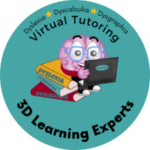
Dyscalculia often referred to as “Math Dyslexia”, is a specific learning disability that impacts an individual’s proficiency in understanding and working with numbers. It is essential to remember that Dyscalculia has nothing to do with a child’s intelligence; it simply affects their ability to process mathematical information.
Dyscalculia is not a condition that children simply outgrow. Without proper intervention and support, the difficulties can persist into adulthood, affecting educational and career opportunities. However, with early recognition and targeted assistance, children with Dyscalculia can build essential mathematical skills and achieve their full potential.
Understanding the intricate nature of Dyscalculia is the first step in helping your child. It’s essential to recognize that they may need tailored strategies and support to overcome the challenges this condition presents.
Key Points to Remember
- Dyscalculia is a specific learning disability that affects a person’s ability to understand and work with numbers, arithmetic concepts, and mathematical symbols.
- Dyscalculia can manifest differently in individuals. Some may struggle with basic number sense, while others may have difficulty with mathematical operations or problem-solving.
- Common challenges associated with Dyscalculia include difficulty with counting, memorizing math facts, telling time, understanding math symbols, and following mathematical processes.
- Dyscalculia is not related to a person’s overall intelligence. Individuals with Dyscalculia may excel in other areas but struggle with math.
- Dyscalculia can co-occur with other learning disabilities like Dyslexia or ADHD. These co-occurring conditions can make it more challenging to learn math.
- Early identification and intervention are crucial for students with Dyscalculia. Teachers and parents should be vigilant for signs of math difficulties.
- Teaching math using multisensory approaches, manipulatives, and visual aids can be effective for students with Dyscalculia.
- Tailored interventions and accommodations, such as extended time for math assignments or the use of assistive technology, can help students with Dyscalculia succeed in math.
- Dyscalculia can lead to math anxiety, which may further hinder a person’s ability to perform math tasks. Building confidence and reducing anxiety is important.
- Dyscalculia can impact daily life skills that involve math, such as managing money, telling time, and measuring ingredients. Developing these skills is essential for independent living.
What are some common signs of Dyscalculia?
- Difficulty recognizing numbers and counting.
- Struggles with basic arithmetic, like addition and subtraction.
- Challenges understanding math concepts, including fractions and percentages.
- Mastering multiplication can be particularly challenging due to their difficulties in processing and understanding mathematical concepts
- Poor grasp of time-related concepts.
- Algebra is especially challenging, as it involves abstract mathematical concepts and problem-solving.
- Issues with spatial relationships and Geometry.
- Inconsistent problem-solving in real-life math situations.
- Math-related anxiety and frustration.
- Difficulty memorizing math facts.
- Directional confusion, such as left from right.
What Causes Dyscalculia?
Dyscalculia’s exact cause is still being researched, but it’s believed to have a neurological basis. Some studies suggest that it may be hereditary, as it often runs in families. Brain structure and function differences in areas related to mathematical processing have also been observed in individuals with Dyscalculia.
At What Age Can Dyscalculia Be Identified?
Dyscalculia can be identified as early as preschool or Kindergarten. Signs of mathematical difficulties become more apparent as children progress through school. Many times parents and teachers are not aware of the severity of the problem until their child goes to high school.
Can Dyscalculia Be Improved Or Overcome?
While Dyscalculia doesn’t have a cure, individuals can improve their mathematical skills through specialized interventions, accommodations, and strategies tailored to their needs.
Can Dyscalculia Coexist with Other Neurodiversities?
Yes, Dyscalculia can coexist with other learning disabilities such as:
- Dyslexia: While Dyslexia primarily affects reading and language skills, individuals with Dyslexia may also struggle with certain aspects of math, such as word problems and understanding mathematical symbols.
- Attention Deficit Hyperactivity Disorder (ADHD): ADHD can lead to difficulties with attention, focus, and impulse control, which can affect a student’s ability to concentrate on math tasks and follow multi-step instructions.
- Working Memory Issues: Weak working memory can make it challenging for individuals to remember and manipulate numbers and mathematical concepts.
- Visual Processing Disorders: Visual processing disorders can affect an individual’s ability to perceive and interpret visual information, which is important for understanding math concepts and recognizing mathematical symbols.
- Auditory Processing Disorders: These can impact an individual’s ability to process and understand auditory information, which is essential for comprehending math problems and instructions.
- Executive Functioning Difficulties: Executive functioning skills, such as organization, planning, and working memory, are crucial for math problem-solving. Difficulties in executive functioning can contribute to math challenges.
- Specific Language Impairment: This condition affects an individual’s language development and communication skills, which can indirectly influence their math learning.
Is There a Specific Test for Dyscalculia?
There isn’t a single, universally accepted test for Dyscalculia. Diagnosis typically involves a battery of assessments, including cognitive, educational, and psychological evaluations. A qualified specialist, such as an educational psychologist, can conduct these assessments to make a formal diagnosis.
Can I Help My Child Build Self-esteem When They Struggle with Math?
Building self-esteem involves providing a nurturing and supportive environment. Focus on your child’s strengths, celebrate their successes, and encourage their efforts. Avoid negative feedback and emphasize that everyone learns at their own pace.
Schedule A Consultation
Schedule a free consultation today to find out how 3D Learning Experts can help you and your smart student struggling in school.
